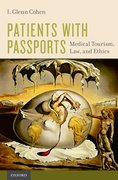The first two chapters of I. Glenn Cohen's new book (out in Dec. 2014 with Oxford Univ. Press), Patients With Passports, are available here: http://papers.ssrn.com/sol3/
Abstract:
Can your employer require you to travel to India for a hip replacement as a condition of insurance coverage? If injury results, can you sue the doctor, hospital or insurer for medical malpractice in the country where you live? Can a country prohibit its citizens from helping a relative travel to Switzerland for assisted suicide? What about travel for abortion? In his new book, Patients with Passports, just released by Oxford University Press, he tackles these important questions, and provide the first comprehensive legal and ethical analysis of medical tourism.
Medical tourism (or "medical travel") is a growing multi-billion dollar industry involving millions of patients who travel abroad each year to get health care. Some seek legitimate services like hip replacements and travel to avoid queues, save money, or because their insurer has given them an incentive to do so. Others seek to circumvent prohibitions on accessing services at home and go abroad to receive abortions, assisted suicide, commercial surrogacy, or experimental stem cell treatments.
This material the press has allowed him to upload to SSRN for distribution includes the front matter and the first two chapters of the book.
The "Preface" chapter introduces the book and the scope of medical tourism through the stories of six sets of medical tourists (some real persons, others composite) that sketch the very different needs, hopes, and experiences of patients traveling for care.
A second chapter, "An Introduction to the Medical Tourism Industry," introduces the industry at a more theoretical and data-centered level. It describes various ways of dividing the industry and brings together all the best existing available data to give a thick descriptive account of the industry and its major players: home country governments, destination country governments, destination country hospitals and their staffs, accreditors, facilitators, insurers, home country partner hospitals, and industry associations.
As these chapters and the book itself demonstrates, very different patients are traveling for very different reasons that raise very different legal and ethical issues. Some patients are traveling for cardiac bypass and other legal services to places like India, Thailand, and Mexico. He analyzes among other things issues of quality of care, disease transmission, liability, private and public health insurance, and the effects of this trade on foreign health care systems. Other patients are using medical tourism to attain services illegal in the patient's home country, such as organ purchase, abortion, assisted suicide, fertility services, and experimental stem cell treatments. Here, he examines issues such as extraterritorial criminalization, exploitation, immigration, and the protection of children.
Through compelling narratives, expert data, and industry explanations, his goal is to connect the reader to the most prevalent legal and ethical issues facing medical tourism today.
Can your employer require you to travel to India for a hip replacement as a condition of insurance coverage? If injury results, can you sue the doctor, hospital or insurer for medical malpractice in the country where you live? Can a country prohibit its citizens from helping a relative travel to Switzerland for assisted suicide? What about travel for abortion? In his new book, Patients with Passports, just released by Oxford University Press, he tackles these important questions, and provide the first comprehensive legal and ethical analysis of medical tourism.
Medical tourism (or "medical travel") is a growing multi-billion dollar industry involving millions of patients who travel abroad each year to get health care. Some seek legitimate services like hip replacements and travel to avoid queues, save money, or because their insurer has given them an incentive to do so. Others seek to circumvent prohibitions on accessing services at home and go abroad to receive abortions, assisted suicide, commercial surrogacy, or experimental stem cell treatments.
This material the press has allowed him to upload to SSRN for distribution includes the front matter and the first two chapters of the book.
The "Preface" chapter introduces the book and the scope of medical tourism through the stories of six sets of medical tourists (some real persons, others composite) that sketch the very different needs, hopes, and experiences of patients traveling for care.
A second chapter, "An Introduction to the Medical Tourism Industry," introduces the industry at a more theoretical and data-centered level. It describes various ways of dividing the industry and brings together all the best existing available data to give a thick descriptive account of the industry and its major players: home country governments, destination country governments, destination country hospitals and their staffs, accreditors, facilitators, insurers, home country partner hospitals, and industry associations.
As these chapters and the book itself demonstrates, very different patients are traveling for very different reasons that raise very different legal and ethical issues. Some patients are traveling for cardiac bypass and other legal services to places like India, Thailand, and Mexico. He analyzes among other things issues of quality of care, disease transmission, liability, private and public health insurance, and the effects of this trade on foreign health care systems. Other patients are using medical tourism to attain services illegal in the patient's home country, such as organ purchase, abortion, assisted suicide, fertility services, and experimental stem cell treatments. Here, he examines issues such as extraterritorial criminalization, exploitation, immigration, and the protection of children.
Through compelling narratives, expert data, and industry explanations, his goal is to connect the reader to the most prevalent legal and ethical issues facing medical tourism today.
